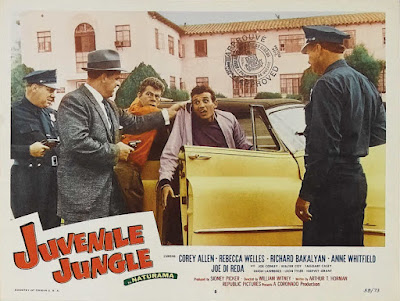Witney had already forever etched his name in Hollywood lore when he teamed up with the likes of Yakima Canutt and the Lydecker Brothers for a ton of barn-burning serials for Republic Pictures -- Daredevils of the Red Circle (1939), The Adventures of Captain Marvel (1941) and The Crimson Ghost (1946) to name a few.
Also, the director's notions on fight choreography and editing soon leeched their way into the majors, too. And if that wasn't enough, at the twilight of his career, Witney also gave us the whole six-pack of awesome known as Darktown Strutters (1975). Here, I’ll also give a hearty recommendation for Witney’s autobiography, In a Door, into a Fight, Out a Door, into a Chase (2008), which chronicles the first half of his career making serials. Alas, Witney would pass away before chronicling the second half of his career.
This was too bad, because I would love to know more about Juvenile Jungle, which was one of the last pictures that Republic would make before the studio went tits up in the late 1950s. The plot is fairly standard: a young, good-looking no-goodnik drifter named McQueen (Allen) finds himself in a new town, where he woos a girl named Glory (Welles), the lovelorn and luckless waitress of the local greasy spoon.
Through her, McQueen wheedles his way into a gang of toughs (Di Rida, Bakalyan, Conley) and convinces them to stop their penny-ante stick-ups for one big score -- knocking off the local liquor store / check-cashing joint by kidnapping and ransoming the owner's daughter.
Things get a little convoluted and contrived from there, as our scheming lothario's plan revolves around him first wooing and romancing said victim (-- a kidnapping without a kidnapping, dig?), drawing the jealous ire of Glory, and the wrath of the rest of the gang, when our boy starts to fall for the perky teenie-bopper (Whitfield) and rapidly develops some cold feet.
Three things, I think, kick Juvenile Jungle a couple notches above its standard Switchblade Pack'n, Vitalis Slick Sport'n and Rocket-Bra Clad brethren. First, Arthur Horman's script doesn't preach or rail against the loutish behavior of our kooky criminals but plays it more like a standard hard-boiled crime drama of that era.
Second, the stable of actors, including an extended cameo by the lovely and always welcomed Yvette Vickers (-- and somewhere, Robert Conrad was lurking but I failed to spot him), and then anchored by the wily vet Richard Bakalyan and a strong turn by a pre-The Waltons Joe Conley as their inside man, helps smooth things out considerably when head thug Joe Di Reda threatens to spit the bit and start gnawing on the scenery.
Corey Allen and Anne Whitefield are likable as a couple and spark the old chemistry set -- you actually believe this idiot would straighten out for her; but the real star of the show is the spurned Rebecca Welles, who, when things start to unravel, with nothing left to lose, is the one with the chutzpah to hold it together and push the others through to the bitter end, which brings us to the third thing I really liked and found interesting about this flick.
As I said before, Juvenile Jungle is more of a crime drama than a high school safety screed. Pretty pedestrian on the surface, yes, with a few flashes of brilliance, but what really makes this thing work is if you consider Welles' character as our protagonist and not Allen's malcontent with a misunderstood heart of gold.
The film's promotional materials really do Welles a disservice, too, branding her as the pied piper out for kicks, who leads those around her to a tragic end. Wrong. Dead wrong. (And to add insult to injury, all the promotional materials for Juvenile Jungle calling for Welles' head for her myriad sins showcase Vickers’ assets instead!)
Like most characters in these old hard-boilers, Welles is just another working stiff who throws caution to the wind when she falls for the wrong guy -- here, with the genders switched, she becomes prey for a homme fatale -- and makes the tragic mistake of buying into his cock-n-bull load about the big score and the easy life it promises.
Of course these things never, ever work out. And after she gives it all up for him, emotionally, physically, and financially, only to be double-crossed and dumped, with her eyes still firmly on the prize, and, yes, a little biblical payback on her ex-lover as an added bonus, Welles is soon on the warpath and barreling down the road to ruin.
Thus, when we reach the inevitable climax, with things falling apart around her, her dreams going up in smoke and bitch-slaps and a tightening police dragnet, Welles is left holding the smoking gun, while the real villain, Allen, who got her into this quagmire in the first place, will, for all intents and purposes, despite his injuries, get the (other) girl of his dreams, land his big score by default, and basically gets away with it all.
And that, my friends, is some pretty screwed up shit, right there.
Originally posted on November 19, 2010, at Micro-Brewed Reviews.
Juvenile Jungle (1958) Coronado Pictures Inc. :: Republic Pictures / P: Sidney Picker / D: William Witney / W: Arthur T. Horman / C: Jack A. Marta / E: Joseph Harrison / M: Jerry Roberts / S: Corey Allen, Rebecca Welles, Richard Bakalyan, Anne Whitfield, Joe Di Reda, Joe Conley, Yvette Vickers









%201958.jpg)
No comments:
Post a Comment